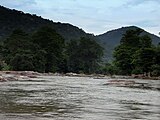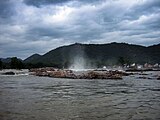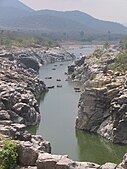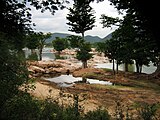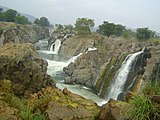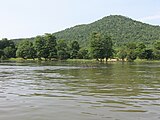Hogenakkal Falls
| Hogenakkal Falls | |
|---|---|
 Hogenakkal Falls | |
 | |
| Location | Tamil Nadu , India |
| Coordinates | 12°07′09″N 77°46′26″E / 12.1192°N 77.7740°E |
| Longest drop | 20 m |
Hogenakkal Falls or Hogenakal Falls (Template:Lang-kn, Template:Lang-ta) is a waterfall in South India on the river Kaveri. It is located at the border of the southern Indian states of Karnataka and Tamil Nadu,[1][2][3][4][5][6] about 180 km (110 mi) from Bangalore and 250 km (160 mi) from Chennai city. It is sometimes referred to as the "Niagara of India".[7] With its fame for medicinal baths and hide boat rides, it is a major site of tourist attraction. Carbonatite rocks in this site are considered to be the oldest of its kind in South Asia and one of the oldest in the world.[8] This is also the site of a proposed project to generate drinking water.
Etymology
The word Hogenakal is formed of two Kannada words hoge and kal. When the water falls on the rocks it appears as if hoge (smoke) is emanating from the top of the kal (rock) because of the force of the water, hence Hogenakkal (smoking rocks).[9] It is also called as Marikottayam by the people of Tamil Nadu.[10]
River
The Kaveri is considered to form at Talakaveri in the Brahmagiri hills in Kodagu district in Karnataka and gathers momentum as the land drops in elevation. It becomes larger as various tributaries feed into it on the way down.[1] At Hogenakkal, the Kaveri, now a large river, drops and creates numerous waterfalls as the water cuts through the rocky terrain. In places the water falls as much as 20 m (66 ft) and is said to sound like continual thunder.[citation needed] Soon after the falls the river takes a southerly course and enters the Mettur Reservoir.[1] The river carries sediment which makes the downriver land fertile.
At Hogenakkal the river spreads out over a wide area of sandy beaches, then flows through to the Mettur Dam and creates a 60 sq mi (160 km2). lake called Stanley Reservoir. Built in 1934, this project improved irrigation and provided hydropower.[11]
Weather
The best season to visit is soon after the monsoons, when the river is in full spate. But some tourists prefer to visit during off-season to skip the crowd. The temperature in summer varies between 23–34 °C (73–93 °F) while during the winter it is still pleasant and ranges from 13–27 °C (55–81 °F).[12]
Bathing
This section contains promotional content. (July 2011) |
Hogenakkal waterfalls is a beautiful picnic spot with its waters supposed to be having curative powers.[13] Hogenakkal is set in thick, green woods and is considered both a sacred bathing place and a spa-like health resort. Here the water spreads for miles around. The area is surrounded by hills and offers lovely panoramic view. People can take bath in the Kaveri river, before and beyond the falls. Before reaching Hogenakkal, the river flows through a forest which contains herbs that are traditionally believed to enhance health. Hence bathing in these waters is believed to be curative.
Boating
Boating in Hogenakkal is allowed during the dry-season as the water falls are not strong enough to disrupt the passage of the boats. Local coracles operate from both the Tamil Nadu and Karnataka banks of the gorge.[14] This is the main source of income for these boat operators. The coracles are about 2.24 m (7 ft 4 in) in diameter,[14] but still can take a load of eight persons at a time.[15] These coracles are made of bamboo, and with all materials available takes about a day to build.[14] The bottom of the boats are made waterproof by the use of hides, but sometimes with sheets of plastic.[16] Use of plastics in the Hogenakkal vicinity, not just for boats, has been criticised due to problems with pollution.[17] These boats are steered and propelled using a single paddle, making them unique.[14] The coracles are locally called parisal in Tamil[14] and either teppa[18] or harigolu in Kannada.[14]
Freshly caught fish are sold by the gorge and also various vendors selling water and snacks up and down the gorge rowing their coracles is not uncommon. The fish caught include katla, robu, kendai, keluthi, valai, mirgal, aranjan and jilaby.[14] After leaving the gorge, on the left shore one can find improvised stalls set up on the sand. There, one can let the fresh fishes be prepared in one of the many kitchens. Also, many people can be found swimming or bathing around there.
Hogenakkal water project
Hogenakal Falls is the location for the Hogenakkal Integrated Drinking Water Project proposed by the Tamil Nadu Government.[19] The objective of this project is to provide safe drinking water to the urban and rural areas in Krishnagiri and Dharmapuri districts.[20] In February 2008, The Japan Bank for International Cooperation agreed to fund the Rs 1,340-crore project.[21]
Gallery
See also
References
- ^ a b c ARTICLE 262 AND INTER-STATE DISPUTES RELATING TO WATER Ministry of Law, Government of India
- ^ "Taluk Information". Tnmaps.tn.nic.in. Retrieved 2008-11-07.
- ^ Karnataka State Tourism development Corporation
- ^ Station Details
- ^ "National Portal of India : Know India : State and UTs". India.gov.in. Retrieved 2008-11-07.
- ^ Dharmapuri district Tamil Nadu Tourism development corporation
- ^ "Hogenakkal row: Time to show restraint - National News – News – MSN India - News". News.in.msn.com. Retrieved 2008-11-07. [dead link]
- ^ "2.0 Ga old pyroxenite-carbonatite complex of Hogenakal, Tamil Nadu, South India". Cat.inist.fr. Retrieved 2008-11-07.
- ^ "Dharmapuri district - places of interest". tamilnadutorism.org. Retrieved 2006-11-11.
- ^ "Hogenakal". Mmhills.com. Archived from the original on 2008-06-02. Retrieved 2008-11-07.
- ^ "Cauvery River in Southern India". cauvery.com. Retrieved 2006-11-11.
- ^ http://www.hogenakkal.com/services.html
- ^ http://www.hogenakkal.com/
- ^ a b c d e f g Boats of South Asia- by Sean McGrail el al.,
- ^ The Hindu - Row, row, row your boat
- ^ Hide boats at Hogenakal on the river Kaveri, Tamil Nadu- by C Palmer et al.
- ^ Garbage ruining Hogenakkal's beauty - The Hindu
- ^ Hogenakkal falls
- ^ The Hindu - The 1998 story of Hogenakkal
- ^ Times of India - Hogenakkal project: Water of hope
- ^ Business Line - Japan Bank agrees to fund Hogenakkal water project


